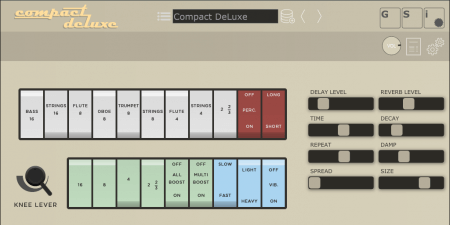Windows
Genuine Soundware Compact DeLuxe v1.0.0 [WiN]

Team R2R | 26 July 2023 | 3.68 MB
Among the many transistor organs of the past, also known as "Combo Organs" (mostly because some of them also had a rhythm section and built-in speakers), the Farfisa Compact DeLuxe, along with its big brother the Compact Duo, was one of the most used organs at least in the european beat scene of the early and mid seventies.
The electronic circuit of this kind of organ is relatively simple, at least on paper: rather than using a mechanical tone generator like the tonewheel models (Hammond and Pari), the transistor organs used a circuit called "Top Octave Synthesizer", TOS for short, responsible of the generation of 12 waveforms, one for each note of the last octave of the organ keyboard. The basic waveform was usually something halfway between a ramp and a triangular. The lower octaves were produced by means of "divider" circuits that could halve the frequency of each waveform, going so forth for each lower octave down to the pedalboard tones. At each division, something was lost and something was gained in terms of harmonic content.
he result was that the same notes of different octaves had oscillators perfectly in sync, so all C notes were in sync, all C#, all D and so on. This same technique was also used in so-called "string machines" or "stringer keyboards" that emulated orchestral sounds (violins, trumpets, etc.) - see GSi's Electrorchestra.
The various registers in combo organs were produced by passing the raw waveforms through a filter bank, so some waveforms were low-pass filtered for bass-like sounds, some were high-pass filtered for violin-like sounds, etc. and some waveforms also went through more than one filter. This also adds some level of phase shifting between waveforms coming from different registers, the reason why the sum between, e.g. a Flute 8' and a Violin 8' isn't exactly the superimposition of the two waveforms, but something slightly different. And this is one of those underrated details that made the sound of some Combo Organs pretty unique.
The sound engine of GSi Compact DeLuxe is also included in the GSi Gemini as well as in the Crumar Mojo 61.
Of course this type of instrument gives its best if run through external effects and amps. Have a look at the GSi catalog and experiment with some of the effects offered by GSi.
Main features
Component Modeling engine (no samples, all real-time synthesis)
Full Polyphony (61 notes, 12 Top-Octave Oscillators + Frequency Dividers)
Key multi-contact simulation with authentic and adjustable key click
Authentic recreation of the Farfisa register filters
Recreation of the background noise and leakage
Adjustable vibrato (speed and depth)
Built-in Stereo Delay effect
Built-in Stereo Reverb effect
Built-in programmer with unlimited Programs
Embedded user's manual
Available as Stand-alone application and audio plugin
Very low CPU and RAM usage
A witch says,
While our keygen is true keygen which can work for both WIN/MAC, the binaries included in thisrelease are patched to disble home calling.
home page
The electronic circuit of this kind of organ is relatively simple, at least on paper: rather than using a mechanical tone generator like the tonewheel models (Hammond and Pari), the transistor organs used a circuit called "Top Octave Synthesizer", TOS for short, responsible of the generation of 12 waveforms, one for each note of the last octave of the organ keyboard. The basic waveform was usually something halfway between a ramp and a triangular. The lower octaves were produced by means of "divider" circuits that could halve the frequency of each waveform, going so forth for each lower octave down to the pedalboard tones. At each division, something was lost and something was gained in terms of harmonic content.
he result was that the same notes of different octaves had oscillators perfectly in sync, so all C notes were in sync, all C#, all D and so on. This same technique was also used in so-called "string machines" or "stringer keyboards" that emulated orchestral sounds (violins, trumpets, etc.) - see GSi's Electrorchestra.
The various registers in combo organs were produced by passing the raw waveforms through a filter bank, so some waveforms were low-pass filtered for bass-like sounds, some were high-pass filtered for violin-like sounds, etc. and some waveforms also went through more than one filter. This also adds some level of phase shifting between waveforms coming from different registers, the reason why the sum between, e.g. a Flute 8' and a Violin 8' isn't exactly the superimposition of the two waveforms, but something slightly different. And this is one of those underrated details that made the sound of some Combo Organs pretty unique.
The sound engine of GSi Compact DeLuxe is also included in the GSi Gemini as well as in the Crumar Mojo 61.
Of course this type of instrument gives its best if run through external effects and amps. Have a look at the GSi catalog and experiment with some of the effects offered by GSi.
Main features
Component Modeling engine (no samples, all real-time synthesis)
Full Polyphony (61 notes, 12 Top-Octave Oscillators + Frequency Dividers)
Key multi-contact simulation with authentic and adjustable key click
Authentic recreation of the Farfisa register filters
Recreation of the background noise and leakage
Adjustable vibrato (speed and depth)
Built-in Stereo Delay effect
Built-in Stereo Reverb effect
Built-in programmer with unlimited Programs
Embedded user's manual
Available as Stand-alone application and audio plugin
Very low CPU and RAM usage
A witch says,
While our keygen is true keygen which can work for both WIN/MAC, the binaries included in thisrelease are patched to disble home calling.
home page
Only registered users can see Download Links. Please or login.


No comments yet